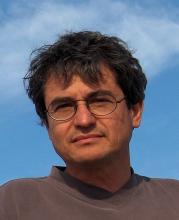What Is It
Even in ancient Greek society, philosopher-scientists engaged in heated debate about the origin, composition, and structure of our universe. Tracking our understanding of cosmology from then until now shows monumental shifts in thinking. So what did the Ancients think was the fundamental nature of the cosmos, and what kind of evidence did they use to support their theories? How did Copernicus provoke such a radical shift in cosmology? And what should we think about the status of scientific theories if they can be subject to such massive conceptual shifts? John and Ken ponder the cosmos with Carlo Rovelli from Aix-Marseille University, author of Seven Brief Lessons on Physics.
Part of our series A Philosophical Guide to the Cosmos
Listening Notes
Can we even consider ancient cosmology science? Ken is shocked by how much the ancients got wrong, while John makes a case for how sophisticated their discoveries were. So is getting it wrong just a part of what science is? But if mythology and religion were embedded in the so-called scientific process, should we then stop considering it as science?
Prominent physicist Carlo Rovelli joins the show, describing the excellent work done by the ancients—particularly the Greeks—and that he certainly considers it science. We hear about who Rovelli thinks of as the first scientist, Anaximander, who thought about whether the earth is round or not. Ken wonders why it took so long for these scientists to figure out that the earth was not the center of the earth, and Rovelli explains the relevant difficulties.
John then presses him on whether it makes sense to hope that eventually quantum mechanics is abandoned, because it seems so complicated and counter-intuitive. Rovelli challenges how much to rely on our common-sense intuitions. Moving past the ancient Greeks, Rovelli surveys the contributions of the Islamic world to mathematics and cosmology.
Listeners start to call in, and the discussion moves towards whether science increases or decreases our hubris about our knowledge of the world, especially as an alternative to religious points of view. Huge questions loom in the background of this show: Rovelli expresses his skepticism of scientific relativism—that you can reasonably accept or reject that the earth revolves around the sun.
The show’s last set of queries covers what our conception of science is and how we should think of it as progressing.
- Roving Philosophical Report (seek to 6:21): Shuka Kalantari talks to a series of creation myths, as told and assessed by children. We hear the fascinating cosmology stories from China, India, and Scandinavia, as well as a recap of the well-known Judeo-Christian one.
- Sixty-Second Philosopher (seek to 47:26): Ian Shoales more carefully explores the significance of the specifics of various creation myths. He wonders how these stories were supposedly known or created, and subsequently passed down.

Comments (1)
Harold G. Neuman
Thursday, January 3, 2019 -- 10:06 AM
You posed THE question byYou posed THE question by asking if getting it wrong is just a part of what science is. Of course it is. It is also hard to imagine where we might be if science(or anyone else) NEVER got it wrong. Dennett got it right when he said it is good to make mistakes. The implications of this are staggering, if taken to their logical conclusions: 1. If science (and/or other disciplines) had never gotten things wrong, we might have to deduce that they had either never tried very hard or had given up without even a minimal fight, and 2. The human consciousness would be far inferior to what it is cracked up to be. But, humans are curious about their surroundings and the compulsion to know and understand things is, thankfully, very much alive. We are going to test this hypothesis very soon---actually, much of that is going on right now. In every sort of way, for every sort of reason you might care to think of. I trust we are still making mistakes. Any viable future might depend upon it. Maybe that is what Dennett really meant---whether he knew it or not.